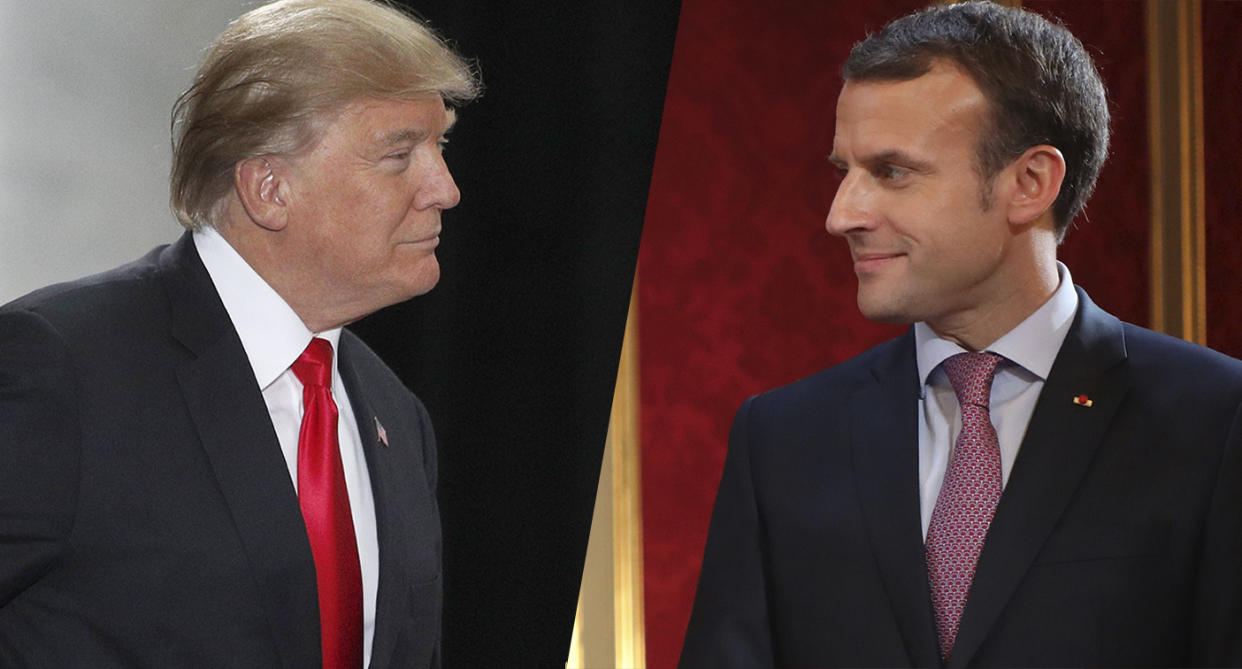French president supposedly urges Trump not to act on Jerusalem. Trump heard something different.

French President Emmanuel Macron strongly warned President Trump on Monday not to formally recognize Jerusalem as Israel’s capital, the Elysée Palace said in a summary of the phone call between the two leaders — or maybe he didn’t, if you go by the administration’s version of the same conversation. The synopsis released by the White House, called a “readout,” made no mention of the apparent disagreement. Instead, it said only that the two leaders had “discussed the path to peace in the Middle East.”
“The conversation confirmed the close relationship between the United States and France as allies committed to stability in the Middle East and North Africa,” the U.S. readout said blandly.
Macron’s version, on the other hand, went into considerable detail.
“The French president expressed his concern over the possibility that the United States would unilaterally recognize Jerusalem as the capital of Israel,” Macron’s office said.
Macron “reaffirmed that the question of Jerusalem’s status must be dealt with in the framework of peace negotiations between the Israelis and the Palestinians, with the aim in particular to establish two countries, Israel and Palestine, living side by side in peace and security with Jerusalem as [their] capital.”
Israel considers Jerusalem its capital, but the United States, like virtually every other country, stations its ambassador in Tel Aviv. During the campaign last year, Trump promised he would move the embassy to Jerusalem — a long-standing goal of Israeli Prime Minister Benjamin Netanyahu and his American allies — but he has postponed taking action. Facing a deadline to inform Congress of its decision, administration officials told Yahoo News last week that Trump was on track to put off the move, while formally recognizing Jerusalem as Israel’s capital. Not long after the French side released its readout, the White House let it be known that it would not be announcing its plans on Monday, as had been expected.
A 1995 U.S. law requires the United States to move its embassy to Jerusalem but gives presidents the power to delay it in six-month increments.
“The president has been clear on this issue from the get-go that it’s not a matter of if, but a matter of when the embassy will move from Tel Aviv to Jerusalem,” Trump spokesman Hogan Gidley told reporters aboard Air Force One. “No action will be taken, though, on the waiver today,” he said, and the White House will announce Trump’s decision “in the coming days.”
Failure to invoke the waiver would trigger the law’s enforcement mechanism — a 50 percent cut in State Department funding for acquisition and maintenance of facilities overseas until the administration certifies that the embassy in Jerusalem has opened. Officials say that would require the construction of a new embassy because simply relabeling the U.S. consulate in Jerusalem as an embassy is not feasible.
The obstacles to the move are not logistical, but geopolitical. Israel has claimed Jerusalem as its undivided capital since 1950 and supports moving the U.S. Embassy there. But the Palestinians aim to locate the capital of their potential future state in the eastern part of the city, occupied by Israel since the 1967 war. Moving the embassy would effectively ratify the Israeli claim, risking an angry response from Muslim allies. U.S. policy has been to regard the dispute as one of the “final status” issues to be determined in Middle East peace negotiations. Those diplomatic concerns led Trump’s predecessors to break the same pledge that he made frequently on the stump in 2016.
Formally recognizing Jerusalem as Israel’s capital could send shockwaves through the Muslim world — but Trump could soften the blow in various ways, including by acknowledging Palestinian aspirations to have the capital of their hypothetical future state be in East Jerusalem.
Trump and Macron are hardly the first American and French presidents to serve up radically different versions of the same telephone call. After an October 2013 conversation between Barack Obama and François Hollande, the readouts were so at odds that they hardly seemed to stem from the same discussion.
Read more from Yahoo News:



